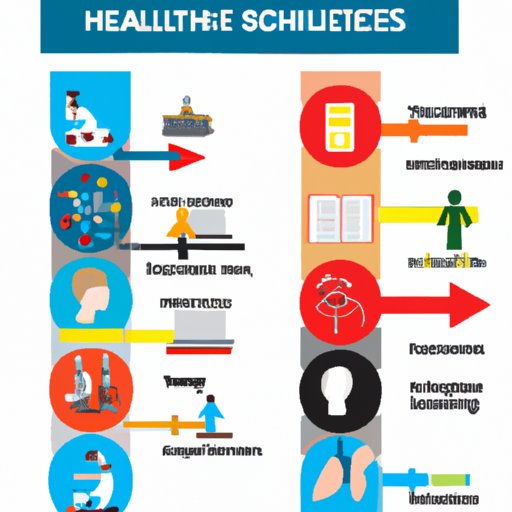
Introduction
Health science is a fast-growing field that offers a wide range of career paths for graduates. With so many options available, it can be challenging to decide which career path to pursue. This article aims to provide guidance to those who are unsure of what career path to take with a health science degree.
Popular Career Paths for Health Science Graduates
There are numerous career paths available to health science graduates, including nursing, public health, physical therapy, occupational therapy, and healthcare administration. Nurses provide patient care and support in a variety of settings, and public health professionals focus on preventing and managing health issues that affect communities. Physical therapists and occupational therapists help patients regain mobility and independence, while healthcare administrators manage healthcare facilities and services.
The benefits of pursuing each of these career paths are vast, including good salary prospects, career stability, and opportunities for professional advancement. However, each career path comes with its unique challenges
Careers in Research
Research is a key driver of innovation and advancement in the health science field. Health science graduates can pursue careers in research as clinical research associates, research coordinators, or lab technicians. Clinical research associates manage clinical trials, research coordinators coordinate research projects, and lab technicians conduct laboratory tests and research.
Careers in research offer the opportunity to contribute to scientific discoveries and are well-suited for individuals who are analytically minded and detail-oriented. However, higher education levels are required to progress in these fields, with additional challenges including long working hours and high demands.
Pursuing a Graduate Degree in Health Science
Pursuing a graduate degree in health science opens up additional job opportunities and can lead to higher salaries. Graduate programs range from a Master’s in Public Health to a Doctorate of Physical Therapy. These programs equip students with advanced knowledge and allow them to specialize in various fields.
Students interested in pursuing a graduate degree should research the various programs available and the admission requirements. Pursuing a graduate degree is beneficial for those seeking broader and more advanced career options.
Non-Clinical Career Opportunities
A health science degree does not necessarily limit graduates to a job working directly with patients. Non-clinical career opportunities include health educators, health consultants, healthcare informatics specialists, and healthcare marketing specialists. Health educators educate individuals and communities on healthy lifestyle practices, while healthcare marketing specialists help healthcare organizations advertise their services and goods effectively.
Non-clinical careers offer the opportunity to work in healthcare without the stress of direct patient care. However, these career paths may require a slightly different set of skills, such as communication, research, and analytical skills.
Industry-Specific Roles
Many industry-specific roles are only available to graduates with a health science degree, which includes medical writers, medical sales representatives, and medical equipment designers. Medical writers create scientific documentation and publications, while medical sales representatives promote and sell medical products to healthcare professionals. Medical equipment designers develop and design healthcare equipment for use by practitioners and patients.
Industry roles are rewarding career paths that provide exciting career growth opportunities and hands-on experience. However, they may also require additional industry-specific knowledge to be competitive and successful in these fields.
Impact of Technology in Health Science Careers
Advancements in technology are shaping the landscape of health science careers. The implementation of emerging technologies such as artificial intelligence, big data, and telemedicine has transformed the way healthcare professionals work. These technologies have improved patient outcomes, increased efficiency, and boosted research advancement.
Adapting to new technologies has been a significant challenge for healthcare professionals, and professionals must be willing to engage in ongoing learning and development to remain successful in their chosen career path.
Conclusion
Career paths for health science graduates are vast and varied. It is crucial for individuals to explore their options, interests and align their goals to achieve success in their chosen field. Pursuing a graduate degree in health science is an exceptional option that opens doors to advanced-level opportunities.
It is essential to stay up-to-date with emerging technologies in the health science field to remain successful. As a final note, we encourage graduates to capitalize on their skill sets and interests to identify and pursue a fulfilling and rewarding career path in the health science industry.




